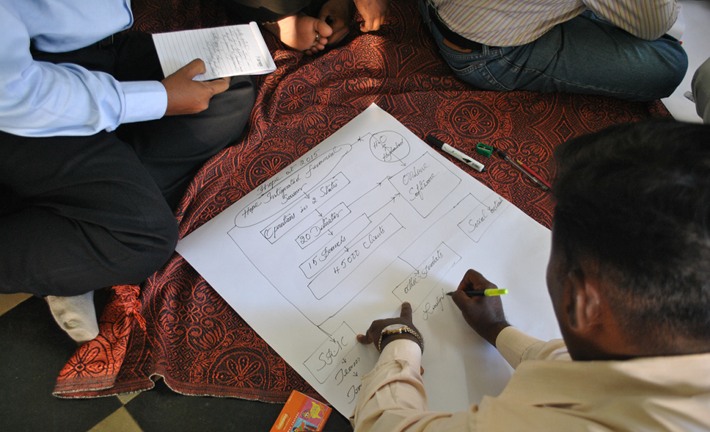“In 5 years, our village would have metal roads, hospitals and old-age homes to take care of the poor, the poor women who work for others now would become employers, giving employment opportunities to many other under-privileged people. We would become a model-village on self-sustenance.”
No, this is not a page out of an election manifesto nor is it a speech by a politician or a government official. This was a vision of a young MFI employee who unleashed his dreams during an Appreciative Inquiry process that we facilitated last week in a small MFI. A remote municipality in rural Andhra Pradesh, Yemmiganur, an hour’s drive from Kurnool (so remote that there was only this one MFI operating in this geography) was where I realised the power of dreams and the potential that lies untapped in rural India.
A big thanks to IFMR Mezzanine team (especially to Jayshree, Irfan and Jayanth) that was willing to experiment in what was otherwise a routine due-diligence process. I was privileged to accompany them and facilitate this AI process for the ten employees of the MFI. We were riding high on the success of our AI summit and wanted to see it applied over a smaller organisation.
Just before lunch, the Mezzanine team concluded the two-day due-diligence process (which in itself was a fascinating experience and a topic worthy enough to qualify as a separate blog post). Ushering all the employees into one room, we split the crowd into three groups. We could sense the participants (including the CEO) were a bit hesitant, as they had not gone through anything like this before, especially amongst their own colleagues. Sitting cross-legged on the floor, they started the AI process by interviewing each other and discussed their high-points in their life and in the job and what made it possible.
Before the session started, one of the participants had asked me what time it would all end, clearly he wanted to see this through and get on with his daily work. But later, when we went around asking them to close their interviews and get ready for the presentation, almost all of them were asking for more time. They were still getting to know their colleagues better and they were enjoying it!
While they were presenting the positive core of strengths of the MFI, there was an evident sense of pride in, not just what they had done but also, what their colleagues had done. They were genuinely appreciative of everything they had discussed.
The next exercise was something that turned out to be quite a revelation to all of us, including the CEO of the MFI. We asked them to dream ahead and come up with a vision for 2015. One hour and lots of drawings and paintings later, the teams went up to share their dreams. We were expecting the groups to share what the MFI would like in 5 years, but the groups had other plans.
Their dreams went way beyond the MFI’s growth. They presented plans to make their villages ‘model villages’. In their dreams there was better infrastructure, better facilities in the villages, better pension plans, and better schools. In 5 years, employees would become self-dependent employers, giving employment opportunities to others. And they tied all this neatly back to their MFI saying they would become an integral part of every household in the state, so much so, that even if the children didn’t take care of their parents, the MFI would!
Clearly, the MFI employees were on a high after dreaming ahead and visioning what the future would look like. It was evident from their repeated words of appreciation to us for having taken them through this process.

The employees had a clear picture of the future in their mind
One of them confessed that, usually when there was an investor visit, they would hope there was no feedback from them and would just wait for the investor to leave. But here, they began to see us as potential partners and not just as investors. They asked for feedback and were keen on learning from the inputs the Mezzanine team had for them post due-diligence.
The AI process had somewhere struck a chord with the MFI employees. It seemed to make the due-diligence process a more welcome exercise and most important of all, it unleashed some ideas from the employees that were powerful not just in scheme but in terms of scale as well. By the end of the process, the spirit of the organisation came out and the fact that they were there for the greater good of the society clearly stood out.
The most striking aspect of the day was the reinforcement of our belief based on which IFMR operates. That the rural folks are very clear in what they could do, given the resources. All they need is access to finance. The rest, they can take care of themselves.



4 Responses
It’s great that the employees there could actually sit down to discover their strengths and share their dreams.This i believe has been anchored and will form part of conversations that will finally translate into action.
Totally excited about the change and high standards that will be brought about by all stakeholders as a result of participating in this process! True power…Power of AI!
It’s great that the employees there could actually sit down to discover their strengths and share their dreams.This i believe has been anchored and will form part of conversations that will finally translate into action.
Totally excited about the change and high standards that will be brought about by all stakeholders as a result of participating in this process! True power…Power of AI!
It is very interesting to see the application of AI at such an early stage… Most interesting thing is how an investor investee relationship has changed because of this.
It is very interesting to see the application of AI at such an early stage… Most interesting thing is how an investor investee relationship has changed because of this.